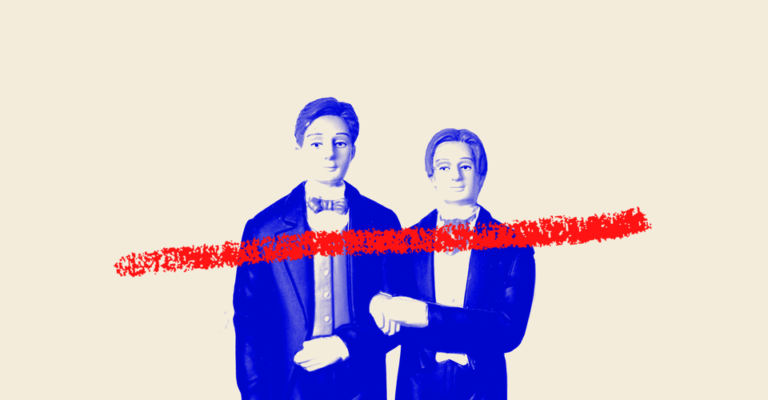

The U.S. Supreme Court is poised to decide a case this term that, once again, pits religious freedom against the rights of the LGBTQ community. Earlier this month, Justice Clarence Thomas, in a concurrence written on behalf of himself and Justice Samuel Alito, attacked Obergefell v. Hodges, the decision that established a constitutional right to LGBTQ marriage. His criticism revolved around its cost to religious opponents: If gay couples have a constitutional right to marriage, the thinking goes, those who oppose gay marriage on religious grounds may be compelled to assist such marriages despite their sincerely held religious convictions to the contrary. This, in turn, makes it “increasingly difficult to participate in society.” Thomas expressed his wish that when there is a clash, religious freedom should outweigh LGBTQ rights.
Thomas may well have his wish granted this upcoming term, especially now that Justice Amy Coney Barrett has joined him on the bench. It is precisely the collision of LGBTQ rights and religious freedom that is at issue in a case scheduled for argument in front of the Court next week. In the case, Fulton v. City of Philadelphia, a Catholic adoption agency challenges the city of Philadelphia for refusing to contract with it after the agency made it known that it would not work with gay couples.
The agency argues that the city’s refusal to contract with it constitutes discrimination against religion. It contends that despite Philadelphia’s anti-discrimination laws, the city itself considers various factors—including religious, economic, and racial considerations—when determining the placement for a child. If the city may take these factors into consideration in service of the “best interests” of the child, the agency opines, then prohibiting a Catholic adoption agency from considering the sexual orientation of potential adopting couples in the name of “religious belief” should be unconstitutional. According to the agency, if Philadelphia provides any exceptions to its general anti-discrimination policy, it must provide exceptions to that rule to religious adoption agencies as well. To not do so, the agency argues, constitutes religious discrimination, which is a violation of religious freedom as guaranteed by the free-exercise clause of the First Amendment.
This argument is not new. In Masterpiece Cakeshop, a case decided in the summer of 2018, plaintiffs argued that the Colorado Civil Rights Commission (a state government agency tasked with, among other things, conducting hearings regarding illegal discriminatory practices) applied the state’s anti-discrimination law discriminatorily against religion because it allowed cake artists to refuse requests to make cakes expressing opposition to same-sex marriage but not to decline requests for cakes in support of it. The Masterpiece plaintiffs reasoned that “a one-sided application” of the statute “defie[d] the requirements of neutrality and general applicability.” Put differently, treating refusals to design cakes that convey opposition to same-sex marriage the same as refusals that convey support is discrimination against religion.
This argument prevailed. Most commentators on the case have focused on the Court’s “animus” analysis—that “derogatory” comments against religion made by certain commissioners were an “indication of hostility [in] the difference in treatment between Phillips’ case and the cases of other bakers who objected to a requested cake on the basis of conscience and prevailed before the Commission.”
But Justice Anthony Kennedy’s reasoning went beyond that. Writing for the majority, he agreed with the plaintiffs that the commission discriminated against religious cake artists by not applying Colorado’s anti-discrimination policy evenly. In short, the Court accepted wholesale the plaintiffs’ argument that the commission acted non-neutrally when it allowed cake artists to refuse requests to make cakes expressing opposition to same-sex marriage but not to decline requests in support of it. A key difference between the two types of “discrimination,” of course, is that there was no law in Colorado against rejecting a request to design a cake expressing opposition to same-sex marriage, while there was a law against refusing to service an individual based on his sexual orientation. But be that as it may, Kennedy, perhaps without quite realizing it, accepted the plaintiffs’ expansive definition of religious discrimination and ran with it.
The potential power of this interpretation of religious discrimination rests on the fact that arguments premised on protection from discrimination are based on the principle of equality rather than liberty. Religious liberty may be no match for the ascendant equality rights in the LGBTQ and contraception contexts.
But religious discrimination, on the other hand, may prove a stronger principle yet. The argument in Fulton is that not only is religion special under the Constitution, but also, irrespective of that specialness, religion must at least be treated equally to secular activities. If secular interests are extended accommodations, religion must be as well. Once the demand for religious accommodations is couched in equality, it is an “equal” match—legally speaking—to LGBTQ-equality rights.
The outcome of Fulton and whether the Court will explicitly adopt an expansive definition of religious equality will have far-reaching implications for the future of free-exercise jurisprudence and how it interplays with LGBTQ rights. For example, the Court’s recent decision in Bostock v. Clayton County purported to change the future of anti-discrimination employment law for LGBTQ employees by extending them protections under Title VII. But if the Court greatly enlarges the concept of religious equality in Fulton, the anti-discrimination protections provided by Bostock could eventually be swallowed up too.
After all, employers’ objections to having LGBTQ employees within their ranks are often connected to religious beliefs. And Title VII already has several exceptions, including the exception for employment decisions that are tied to a “business necessity.” If the Court in Fulton determines that any exception for a secular interest also necessitates, under the free-exercise clause, exceptions for all religious interests, then that ruling would presumably apply to Title VII just as it applies to Philadelphia’s anti-discrimination policy. If it does, it paves the way for the potential collapse of most laws protecting LGBTQ people when they are opposed on religious grounds—which is to say, when they are most often relevant.